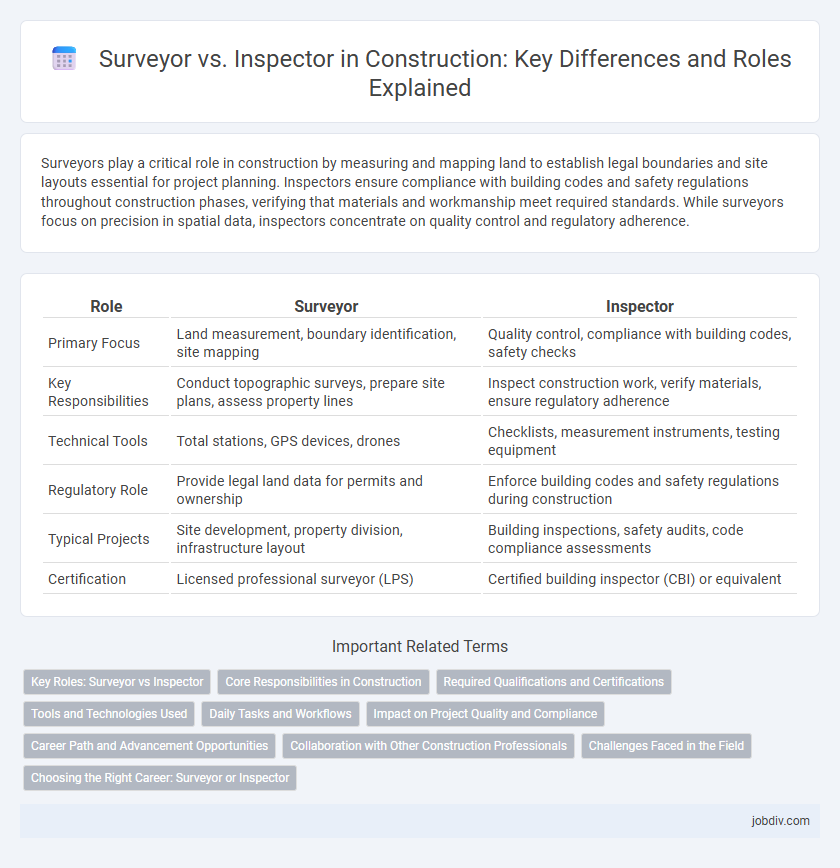Surveyors play a critical role in construction by measuring and mapping land to establish legal boundaries and site layouts essential for project planning. Inspectors ensure compliance with building codes and safety regulations throughout construction phases, verifying that materials and workmanship meet required standards. While surveyors focus on precision in spatial data, inspectors concentrate on quality control and regulatory adherence.
Table of Comparison
| Role | Surveyor | Inspector |
|---|---|---|
| Primary Focus | Land measurement, boundary identification, site mapping | Quality control, compliance with building codes, safety checks |
| Key Responsibilities | Conduct topographic surveys, prepare site plans, assess property lines | Inspect construction work, verify materials, ensure regulatory adherence |
| Technical Tools | Total stations, GPS devices, drones | Checklists, measurement instruments, testing equipment |
| Regulatory Role | Provide legal land data for permits and ownership | Enforce building codes and safety regulations during construction |
| Typical Projects | Site development, property division, infrastructure layout | Building inspections, safety audits, code compliance assessments |
| Certification | Licensed professional surveyor (LPS) | Certified building inspector (CBI) or equivalent |
Key Roles: Surveyor vs Inspector
Surveyors establish precise land boundaries and create detailed site maps crucial for construction planning and legal documentation. Inspectors ensure compliance with building codes, safety standards, and structural integrity by conducting thorough on-site evaluations during various construction phases. Both roles collaborate to guarantee accurate project execution and regulatory adherence, minimizing risks and disputes.
Core Responsibilities in Construction
Surveyors in construction are responsible for measuring land, defining property boundaries, and providing precise topographical data essential for project planning. Inspectors focus on ensuring compliance with building codes, safety regulations, and quality standards through site evaluations and materials testing. Both roles are critical for legal, structural, and safety aspects but differ in their specific technical expertise and scope of work.
Required Qualifications and Certifications
Surveyors typically require a bachelor's degree in surveying, geomatics, or civil engineering, along with certifications such as the Professional Land Surveyor (PLS) license, which varies by state or country regulations. Inspectors must have a high school diploma or associate degree and obtain certifications relevant to their specialization, such as the Certified Construction Inspector (CCI) credential or OSHA safety certifications. Both roles demand strong knowledge of construction codes and standards, but surveyors emphasize precise measurement expertise while inspectors focus on compliance and quality assurance.
Tools and Technologies Used
Surveyors utilize advanced GPS equipment, total stations, and laser scanners to measure land boundaries and topography with precision in construction projects. Inspectors rely on technologies like digital cameras, moisture meters, thermal imaging, and drones to assess structural integrity, safety compliance, and building quality. Both professionals integrate software such as CAD and BIM to enhance data accuracy and streamline reporting.
Daily Tasks and Workflows
Surveyors in construction primarily measure land, establish boundaries, and prepare sites for development using tools like GPS and total stations, ensuring accurate data collection for project planning. Inspectors focus on verifying construction compliance with building codes and safety regulations through site visits, documentation reviews, and defect identification to maintain quality standards. Both roles require detailed reporting and collaboration with project managers to support timely decision-making and project progress.
Impact on Project Quality and Compliance
Surveyors play a critical role in project quality by ensuring precise measurements and accurate site layouts, which form the foundation for structural integrity and compliance with design specifications. Inspectors verify adherence to building codes and safety regulations throughout construction, identifying defects and non-compliance issues that could compromise project standards. The combined efforts of surveyors and inspectors enhance overall project quality, minimize risks, and ensure regulatory compliance, leading to successful and durable construction outcomes.
Career Path and Advancement Opportunities
Surveyors specialize in land measurement, mapping, and boundary identification, providing essential data for construction planning and development, with career advancement often leading to senior technical roles or project management positions. Inspectors focus on ensuring compliance with building codes, safety regulations, and construction standards, progressing toward roles such as quality control manager or regulatory compliance officer. Both career paths offer opportunities for specialization and growth through certifications, advanced training, and experience in the construction industry.
Collaboration with Other Construction Professionals
Surveyors and inspectors collaborate closely with architects, engineers, and project managers to ensure construction accuracy and regulatory compliance. Surveyors provide precise measurements and site layouts, which inspectors use to verify that workmanship and materials meet project specifications and safety standards. Effective communication between these professionals enhances project efficiency and reduces costly errors during construction.
Challenges Faced in the Field
Surveyors often confront challenges such as uneven terrain and adverse weather conditions that hinder accurate measurements and data collection. Inspectors face difficulties ensuring compliance with complex building codes and safety standards amid tight schedules and evolving construction technologies. Both roles require meticulous attention to detail and adaptability to overcome site-specific obstacles and maintain project quality.
Choosing the Right Career: Surveyor or Inspector
Surveyors specialize in measuring land boundaries and preparing sites for construction, requiring expertise in geometry, mapping, and legal regulations. Inspectors focus on evaluating construction quality, safety standards, and code compliance to ensure projects meet regulatory requirements. Choosing between a surveyor and inspector career depends on skills preference: precision measurement and legal documentation versus quality control and safety assessment.
Surveyor vs Inspector Infographic

 jobdiv.com
jobdiv.com